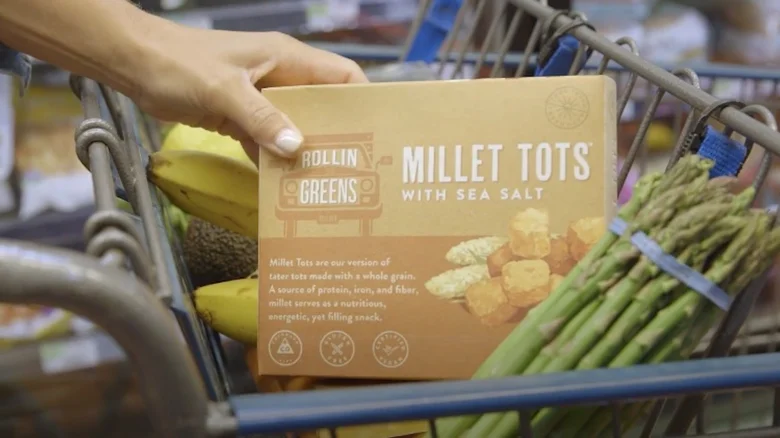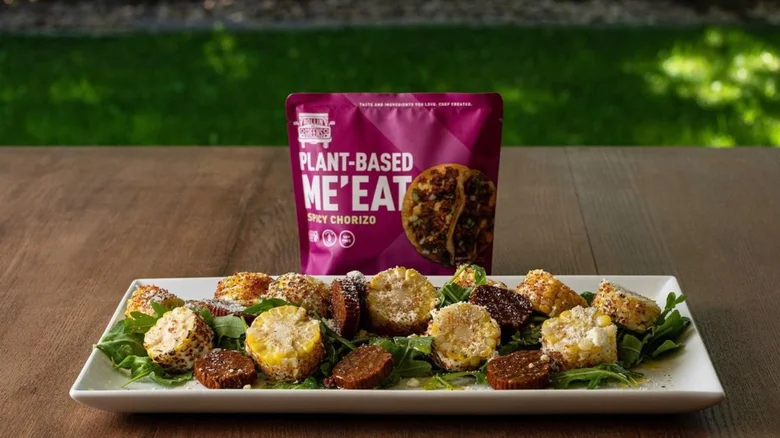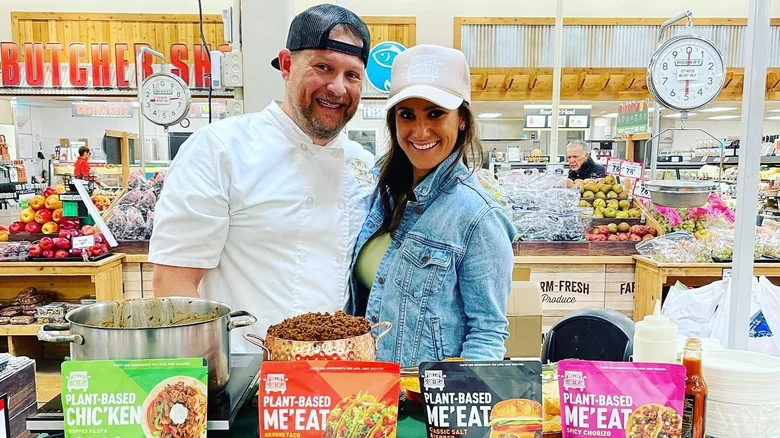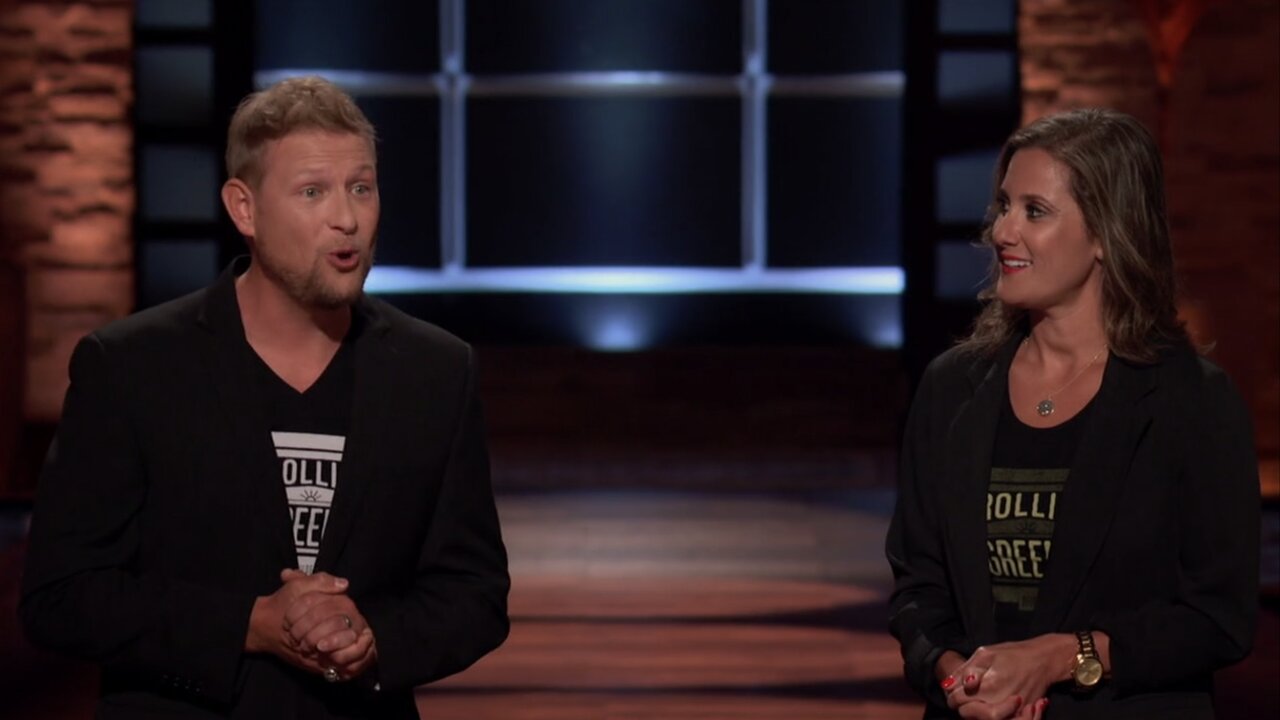When you think of tater tots, you probably picture small, crispy pieces of deep-fried potatoes. But when Lindsey and Ryan Cunningham, a couple who became business partners, walked into the final episode of the eleventh season of Shark Tank, they had a different idea: their frozen tots were made from millet, not potatoes.
Lindsey and Ryan had known each other since childhood, but they didn’t get together as a couple until college, where they bonded over their shared love of food.
With Ryan’s experience as a personal chef and Lindsey’s background in public relations, the pair opened a food truck in Boulder in 2015. It was during this time that they realized running a food truck might be in Ryan’s blood.
Ryan’s parents had operated an organic food truck called Rollin Greens in the 1980s, and it was from this that they got the name for their new business. The idea to use millet in their tots came from Ryan’s childhood, where millet was a staple in their home, thanks to his mother’s love of plant-based cooking.
The newly updated Rollin Greens food truck served healthy meals made with local ingredients to the people of Boulder. But there was one dish that kept customers coming back: Chef Ryan’s millet tots. Realizing they had a big opportunity, Lindsey and Ryan decided to shift their focus from running a food truck to selling their millet tots as packaged frozen food that could be sold across the country.
What happened to Rollin Greens on Shark Tank?
The Cunninghams walked into Shark Tank with samples of their millet tots and their new plant-based cauliflower wings. They hoped to convince the Sharks to invest $500,000 for a 10% share in Rollin Greens.
While the frozen foods seemed to be a hit, the Sharks had some concerns. Lori Greiner really liked how everything tasted, remembering her experience with Bantam Bagels. She mentioned that when something tastes good, it will get a following.

Greiner was ready to make an offer, but she wanted fellow Shark Daniel Lubetzky to join her. However, Lubetzky wasn’t convinced.
In 2018, Rollin Greens had made $320,000 in sales and was expecting to reach $700,000 by the end of the year when the show was filmed. However, the company was losing a lot of money. On top of that, the Sharks were not happy about the small 35% margin on the frozen foods and the lack of focus from the entrepreneurs.
Both Lubetzky and Greiner decided not to make a deal, followed by Mark Cuban and Kevin O’Leary, who said the entrepreneurs would need at least a 50% margin to break even. In the end, Robert Herjavec decided to offer the Cunninghams a deal. Even though he felt the business lacked direction, he believed in their mission to promote clean, plant-based food and agreed to a 20% equity stake in Rollin Greens.
Rollin Greens after Shark Tank
Although the Cunninghams accepted Robert Herjavec’s offer on Shark Tank, the deal did not go through after the show. Despite not getting the funding, things were not all bad. Like many other businesses featured on the show, Rollin Greens benefitted from the “Shark Tank effect.”
After their episode aired, the company received nationwide attention, which brought more people to their frozen food products, resulting in new customers and higher sales.

The Cunninghams told BizWest that traffic on their website in the three weeks after the episode aired went up by 40,000%, compared to the previous year — three times the activity they had in all of 2019. Lindsey shared with the publication, “it’s kind of a weird number to even comprehend because it’s so massive. But it is what it is, and it’s amazing: the Shark Tank effect.”
Rollin Greens was also featured on three QVC segments, where it sold out every time. In 2021, the company won QVC’s best plant-based food award. The entrepreneurs had projected that Rollin Greens would reach $5.5 million in revenue by 2020.
Although it is unclear if they hit that target, nearly half of their revenue that year came from online sales, which were boosted by their Shark Tank appearance.
Is Rollin Greens still in business?
Rollin Greens is still in business and appears to be doing well. However, it operates very differently now compared to when it was on Shark Tank.
Since appearing on the show, the Cunninghams have completely changed their original products and updated the packaging. In 2021, they launched a new line of shelf-stable plant-based products called ME’EAT. The first product in this line was ground taco meat made from pea protein, which quickly became popular on QVC, Thrive Market, and Weight Watchers.

The entrepreneurs later introduced plant-based chorizo and chopped fajita-style chicken, and they made a major change to their previous products by stopping the production of millet tots in 2022.
Even though the tots were sold in 3,500 stores across the U.S., including Walmart, Kroger, and Whole Foods, the profit margins were low. Supply chain problems after the pandemic made production more expensive. On top of that, getting customers to become loyal to millet tots was a tough marketing challenge.
As of April 2024, the cauliflower wings are no longer listed on the company’s website. Rollin Greens has shifted to being a fully plant-based meat business, and its new products seem to be doing better, with higher profit margins. The plant-based chicken even won BrandSpark’s best alternative meat category in 2024.
What’s next for Rollin Greens?
At one point, the Cunninghams had planned to expand their frozen food line with more products like millet tots and cauliflower wings. However, with the shift toward shelf-stable meat alternatives, Rollin Greens is now focused on the plant-based meat industry, similar to other businesses that appeared on Shark Tank like Atlast Monroe.
Despite this change, the company’s mission remains the same: creating plant-based foods using natural ingredients without losing flavor.

As of 2023, Rollin Greens’ new products were available in nearly 4,500 stores across the country, including Raley’s, Sprouts, and Whole Foods. Walmart also increased the company’s presence from 1,700 to 2,400 stores, and Sprouts moved Rollin Greens from its Innovation Centre to a more permanent spot in about 500 stores.
That number is expected to keep growing. The Cunninghams also plan to introduce new products to their ME’EATS line and possibly explore entirely new categories. They might even develop ready-to-eat meals in the future. With an experienced chef as one of the founders, the opportunities for new ideas are endless!
Lessons learned from Shark Tank
Cunningham says she wouldn’t change anything if she were to go on the show again. “I think it was a phenomenal experience,” she said. “I think we went in there really wanting to make a deal, and the PR benefit is just an added bonus.”
Looking back on her time on Shark Tank, Cunningham reflects on how she helped start Rollin Greens at the age of 22. She admits that she could “never be prepared enough” for national television, but let her product and Rollin Greens’ mission guide her throughout the journey.
She encourages other entrepreneurs to do the same. “I would say just go out there and give it your best shot. But in the end, if you know your business, it will shine through,” she tells us. “And you will do well, whether the Sharks see that or consumers see that. Your story and your product will shine through.”
[Updated: 04/04/2025]





